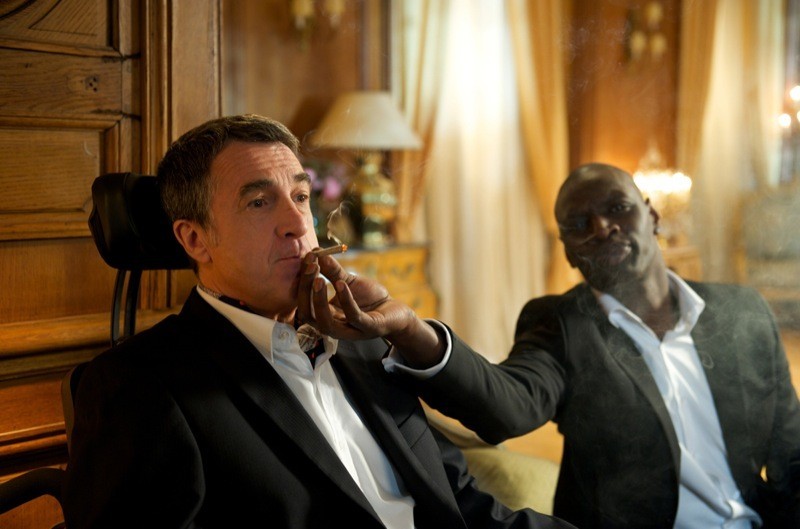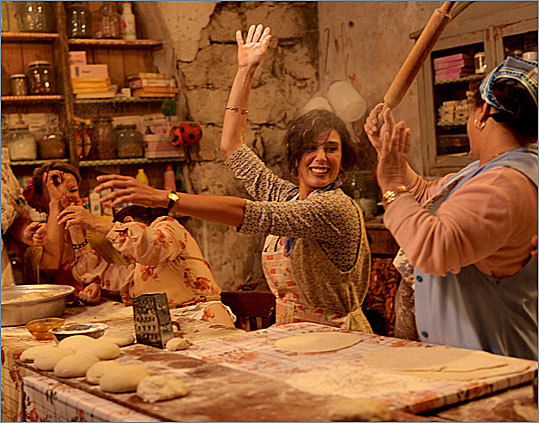This profile of Maggie Gyllenhaal starts in New Haven,
Connecticut. It's not part of the great actress' biography—yet. When I visited
this cultured college town in mid-April, Parker Posey was performing in a play.
The promotional poster for The Realistic Joneses at the Yale Repertory
Theatre made no reference to Posey's mid-1990s reign as an art house darling, a
critic's choice, a Film Comment subscriber's sex symbol.
Gyllenhaal, 34, has resided in these categories since she
blew the doors down in 2002's Secretary, a dark comedy where
Gyllenhaal's meek former mental patient blossoms under the sadomasochistic hand
of her boss (James Spader). It was a jaw-dropping performance, and she soon
proved her mettle in a wide variety of roles: a cosmopolitan coed in Mona
Lisa Smile (stealing the movie from established names like Julia Roberts
and Kirsten Dunst), a scheming chanteuse in Don Roos' Happy Endings, and
Will Ferrell's reluctant, tattooed paramour in the overlooked Stranger Than
Fiction.
She brought electricity to each performance, never coasting
on her willowy good looks or batting her eyes toward magazine covers.
Gyllenhaal just acted her ass off. And it got her places. Her casting as Rachel
Dawes in The Dark Knight, replacing Katie Holmes, was proof that
Hollywood sometimes gets things right.
Since co-starring in that 2008 box office behemoth,
Gyllenhaal's roles, while solid, haven't been as full-bodied, as explosive. She
received an Academy Award nomination for safely escorting Jeff Bridges to his
own Oscar in Crazy Heart, essentially an update of Tender Mercies.
She starred in the sequel to Nanny McPhee, a fact I still can't wrap my
head around. Yes, she was a delight as a crunchy space cadet mom in Away We
Go, Sam Mendes' twee road comedy. But Maya Rudolph was the one tagging
along with John Krasinski.
Should I be concerned? I don't want one of my favorite
actresses to battle Posey for work on the New England theater scene.
***************
Gyllenhaal's newest movie, Hysteria (opening June 1st
in Philadelphia), centers on the 1880s invention of the electric vibrator.
Gyllenhaal is appealing as Hugh Dancy's forward-thinking love interest in this
cheeky, fun romantic comedy, but the role would be considered a challenge for
Meg Ryan circa 1993. Not someone whom film historian Leonard Maltin called
"one of her generation's finest actresses."
Tanya Wexler,
Hysteria's director, describes
Gyllenhaal as an actress women love, the anti-Jennifer Love Hewitt. "For
me, every time I see Maggie on screen, I just go, ' I get her, I connect with
her,'" she says. "I feel like she's a much prettier version of
me…Maggie has this way with grace and style and brilliance and beauty that she
can also embody that feeling of passion." She was Wexler's dream choice
for Charlotte, whom she envisioned as a young Katharine Hepburn. "I think
that's what Maggie is and what Maggie does," Wexler adds. "She's so
strong as an actress," says Dancy, who was surprised that Gyllenhaal (unnecessarily)
maintained an impeccable English accent off camera.
Gyllenhaal was turned on—no pun intended—to Hysteria through
Crazy Heart producer Judy Cairo. "She said, 'This a great script
and it happens to be about the invention of the vibrator, which happened to
take place in 1880s London.' And I thought, 'Oh, it did?' I was definitely
curious to see what the story was or why a movie should be made about it. And
the script itself, I thought, was excellent. Really, really smart. Really
well-crafted." Plus, there was room to play Charlotte her way.
"I don't think this movie is served by an historically
accurate depiction of the woman at that time," she explains.
"[Charlotte's] politics are very simple, basically that women should be
able to go to college and hold a job. Because it wasn't a realistic period
drama about suffragettes, the point is that she should be like from another
planet. She should be as shocking as possible in the constraints of the time,
and I thought that would be fun."
Charlotte may not resemble Gyllenhaal's trademark incendiary
work, but it's a strong, eloquent role in a quality movie. "There are so
few good movies being made these days, there really are, but when there's a
good one everyone wants to do it," she says. "Think about the
actresses who you think are good: So many of them play strong, sexual,
interesting characters and all of us are like, 'I'll do that one!'"
Gyllenhaal says there are a few contemporaries whom she admires and respects.
She doesn't identify those actresses nor the women "who don't seem like
actors to me, who seem like something else." The work among this skilled
secret society gets divided pretty evenly. "Like, OK, that one she's going
to do and this one I'm going to do. And you go through different phases of
being more wanted or less wanted, but I find it goes up and down based on
things that are somewhat out of your control."
OK, but how do you go from Secretary to Crazy
Heart and Nanny McPhee Returns in under 10 years?
"In some ways, it has to do with being young, doing Sherrybaby
in five weeks and falling asleep in my clothes every night, being 25 and
just thinking that is the coolest thing I can do," Gyllenhaal says.
"And I love that movie and I love that performance. I didn't have a
pleasurable time making it, but it was a great experience for me. But, for
example, the character in Crazy Heart I feel like could have been a
friend of mine. There's a different kind of subtlety. She's definitely a
gentler character than either of the characters in Secretary or Sherrybaby,
maybe more grown-up, more subtle, requires a different kind of listening to
hear her.

"I'm in my thirties now, it's a different world, what's
appealing and what speaks to me," she says. In the case of Nanny McPhee
Returns, the script was, in Gyllenhaal's words, "phenomenally
good." She cried while reading it on the New York City subway. Plus, she
couldn't turn down working with Emma Thompson. "It wasn't that I went,
"Let me do some lighter fare.' It was more that I thought, 'This is such a
great script, such a fun, wild woman, and Emma's there every day.' It depends
project to project." For Away We Go, Mendes, who had directed her
husband, Peter Sarsgaard, and brother Jake in Jarhead, called Gyllenhaal
out of the blue with a small part. She liked what she read and filmed her
scenes in three days.
Gyllenhaal says family life—she and Sarsgaard welcomed their
second child, Gloria Ray, in April—doesn't affect the roles she chooses. She
would do something gritty "but I do think it's not worth it to take
my family to Romania to do something that's OK, whereas maybe if I had no kids
I'd go, 'OK, I can do something like this.'" Even if that hypothetical
Romania-based role became her signature performance, considerations linger.
"I would have to put [my older daughter] in school or take a tutor. You
have to send your kid to first grade."
Getting older means that theater, another passion, is
tougher to do. "It's hard with one child, and I imagine will be even
harder with two, to do theater because you never get to put your kid to
bed," says Gyllenhaal, who has starred in productions such as Uncle
Vanya and Closer. "In fact, my favorite experiences in theater
have been with my husband, and that makes it even more difficult because then
neither of you are there to put your child to bed so it's a huge
sacrifice."
It's all about how a project "works with my life and my
husband's life and my husband's career. But I think both of us want to support
each other to do things that are really great."
She's "kind of attached" to a couple of plays. She
and Sarsgaard are looking at collaborations. There's a reunion with Secretary
director Steven Shainberg for something that promises to be
"wild." And if IMDB.com is to be believed, Gyllenhaal is part of a wonderful
ensemble cast for HBO's adaptation of The Corrections, Jonathan
Franzen's epic novel of family dysfunction. In September, she'll play "a
total firecracker" who, along with Viola Davis (a terrific actress), takes
on the Pittsburgh public school system in the unabashedly commercial Won't
Back Down.
A couple of months ago that last role might have concerned
me. What happened to the Maggie Gyllenhaal I knew? But that's silly. She
couldn't spend 20 years being intense, unless she wanted to join Al Pacino and
Robert De Niro in Carciatureland. She hasn't traded credibility for popular
appeal or developed the impenetrable shell of a bankable persona. The hardcore
days of her youth are gone, but Gyllenhaal remains a performer with no
pretensions and boundless curiosity. Those qualities, I'm pretty sure, don't
lead to semi-obscurity in New Haven.
 "Life As We Know It"--I was really, really tired. Apparently, it's funny when attractive, oblivious morons raise a baby. A movie is bound to suck when the premise is "These two attractive opposites are going to fall in love eventually." Don't insult our intelligence.
"Life As We Know It"--I was really, really tired. Apparently, it's funny when attractive, oblivious morons raise a baby. A movie is bound to suck when the premise is "These two attractive opposites are going to fall in love eventually." Don't insult our intelligence. 










